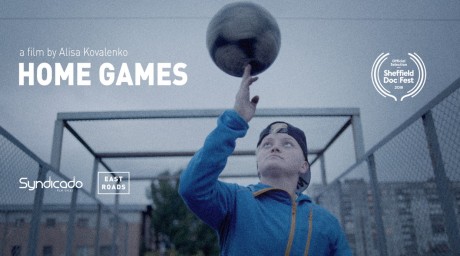


Alisa Kovalenko: Home Games

Alina, 20 year old, Ukrainian, likes football. She plays herself and she is good. In the beginning of the film she is making a collage to hang on the wall, from pictures of famous football players. She cuts off the head of Messi, says sorry to him, and puts her own head on the body of the best football player in the world. At the end of the film Alina is on the football pitch, she is knocked down, gets a free kick, which she kicks herself into the goal just like Messi has done so many times!
A perfect dramaturgical circle (!) for a film, where football is important but that is first of all a warm, heartbreaking social documentary, where Alina is in focus from start till end.
The family includes the granny, the mother, the father, Alina and her two siblings, Renat and Regina, 6 and 7 years old. Plus Alina’s helping girlfriend Nadya. The mother dies, the father is a useless drunkard, the granny is old and not so mobile – so the responsibility for bringing up the two kids lies with Alina, who has games on the football pitch but first and foremost has Home Games to fight. She takes the kids along for a summer training camp, she has to prepare them for the school, she is short of money – the father gets the public support for the kids, he never helps the children – so she and Nadya goes to the street to sell shoes, cell phones, whatever to get some money. She goes with granny and Nadya to have the legal right for the children transferred from the father to her. They are positively received – without this being really followed up in the film except for a text at the end, where it is being said that the father is out of the flat – and you see the two young girls starting a new life refurnishing the apartment. “We want to live like normal people now”.
The film lives from its ability to create a feeling of presence in the situations with Alina and the kids. Here there are fine, often poetic moments in the claustrophobia of the small flat. On the football pitch, it is not poetry that reigns, when the coach states to the girls that they have “to die on the pitch”, a sentence which will probably be used many times the next month in a neighbouring country.
Ukraine/ France/ Poland, 2018, 86 mins.